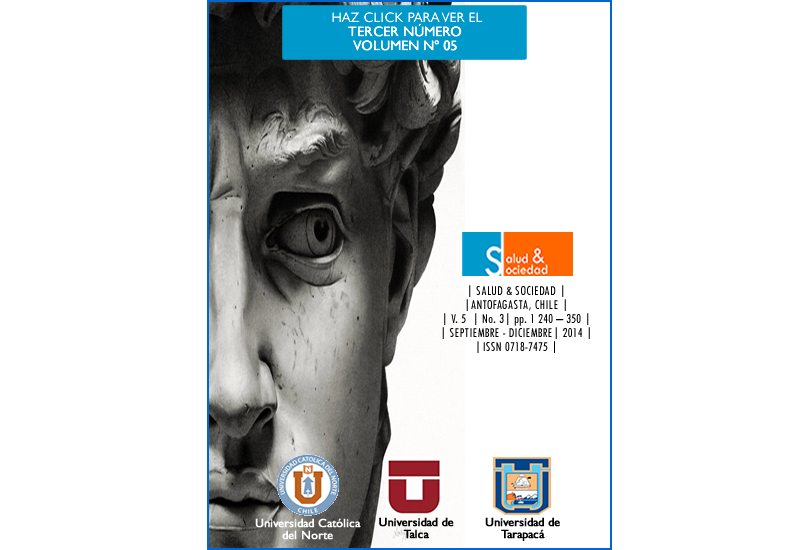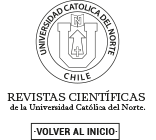Predicción de las respuestas psicológicas del duelo ante la pérdida de salud por variables de personalidad, religiosidad sociodemográficas, y existenciales.
DOI:
https://doi.org/10.22199/S07187475.2014.0003.00002Palabras clave:
Cáncer, duelo, alexitimia, resiliencia, Cancer, mourning, alexithymia, resilience,Resumen
Objetivo: estudiar la asociación y predecir las respuestas psicológicas del duelo ante la pérdida de la salud por medio de alexitimia, resiliencia, religiosidad y variables sociodemográficas, existenciales y clínicas. Método: se aplicó un cuestionario de preguntas cerradas y abiertas, la escala de respuestas psicológicas del duelo ante la pérdida de la salud, la escala mexicana de resiliencia y la escala de alexitimia de Toronto a una muestra no probabilística de 120 mujeres mexicanas tratadas de cáncer. Resultados: las variables de personalidad de alexitimia y resiliencia, las variables sociodemográficas de ingreso económico y escolaridad, la variable religiosidad, la variable existencial de sentido de la vida y las variables clínicas de efectos secundarios, información, percepción del efecto curativo y adherencia al tratamiento se asociaron con las respuestas psicológicas del duelo. Se especificó un modelo que mostró buen ajuste por Máxima Verosimilitud. En este modelo, bajo afecto negativo fue predicho por menor alexitimia, mayor apoyo familiar, mayor estructura y menores efectos secundarios del tratamiento; la actitud positiva fue predicha por mayor estructura y menor ingreso económico. Conclusión: las dos variables de personalidad estudiadas tuvieron un efecto significativo y mayor que las variables sociodemográficas, de religiosidad, existenciales y clínicas.
Objective: To study the associations and predict the psychological answers to mourning when facing health deterioration caused by personality, religiosity, sociodemographic, existential, and clinical variables. Method: A questionnaire of closed and open questions, the scale of psychological answers to mourning when facing health deterioration, the Mexican scale of resilience and the scale of alexithymia from Toronto were applied to a non-probabilistic sample of 120 Mexican female cancer patients. Results: All variables were associated with the psychological answers to mourning. A model showing a good adjustment to Maximum Verisimilitude was specified. This model, under negative effects, was predicted by less alexithymia, more family support, a higher structure, and less treatment secondary effects. Positive attitude was predicted by a higher structure and a less economic income. Conclusion: The two personality variables had a significant and major effect than the sociodemographic, existential, and clinical variables and the variables of religiosity
Citas
American Psychological Association (2002). Ethical principles of psychologists and code of conduct. American Psychologist, 57, 1060-1073. doi: 10.1037/0003-066X.57.12.1060.
Barreto, P., de la Torre, O., & Pérez, M. (2012). Detección de duelo complicado. Psicooncología, 9, 355-368. doi: 10.5209/rev_PSIC.2013.v9.n2-3.40902.
Blanchard, C. G., Albrecht, T. L., Ruckdeschel, J. C., Grant, C. H., & Hemmick, R. M. (1995). The role of social support in adaptation to cancer and to survival. Journal of Psychosocial Oncology, 13, 75-95. doi: 10.1300/J077V13N01_05
Bratis, D., Tselebis, A., Sikaras, C., Moulou, A., Giotakis, K., Zoumakis, E., & Ilias, I (2009). Alexithymia and its association with burnout, depression and family support among Greek nursing staff. Human Resources for Health, 7(72). Disponible en http://www.ncbi.nlm.nih.gov/pmc/articles/PMC2730051/pdf/1478-4491-7-72.pdf doi: 10.1186/1478-4491-7-72.
Bonanno, G. A. (2004). Loss, trauma, and human resilience: have we underestimated the human capacity to thrive after extremely aversive events? American Psychologist, 59, 20-28. doi: 10.1037/0003-066X.59.1.20.
Burgess, C., Cornelius, V., Love, S., Graham, J., Richards, M., & Ramirez, A. (2005). Depression and anxiety in women with early breast cancer: five year observational cohort study. British Medical Journal, 330, 702-705. Disponible en: http://www.bmj.com/content/330/7493/702.
Büssing, A., & Koenig, H. G. (2010). Spiritual needs of patients with chronic diseases. Religions, 1, 18-27. doi:10.3390/rel1010018.
Cardoso, M. J., Ramos, M. I., Vaz, F. J., Rodríguez, L., & Fernández, N. (2012). Influencia del apoyo familiar en momentos de gran incertidumbre. Revista Prisma Social, 8, 28-47.
Coifman, K. G., Bonanno, G. A., Ray, R. D., & Gross, J. J. (2007). Does repressive coping promote resilience? Affective autonomic response discrepancy during bereavement. Journal of Personality and Social Psychology, 92(4), 745-758. doi: 10.1037/0022-3514.92.4.745
Crespo, N., & Rojas, D. (2010). Clase social y desarrollo de la conciencia metapragmática de los niños. Estudios filológicos, 46, 25-41. Recuperado de http://www.scielo.cl/scielo.php?script=sci_arttext&pid=S0071-17132010000200002&lng=es&tlng=es. doi: 10.4067/S0071-17132010000200002.
Exline, J. J., Park, C. L., Smyth, J. M., & Carey, M. P. (2011). Anger toward God: social-cognitive predictors, prevalence, and links with adjustment to bereavement and cancer. Journal of Personality and Social Psychology, 100, 129-148. doi: 10.1037/a0021716.
Gil, F. L., Costa, G., Pérez, F. J., Salamero, M., Sánchez, N., & Sirgo, A. (2008). Adaptación psicológica y prevalencia de trastornos mentales en pacientes con cáncer. Medicina Clínica, 130(3), 90-92.
Grossarth-Maticek, R., & Eysenck, H. J. (1991). Creative novation behavior therapy as a prophylactic treatment for cancer and coronary heart disease: Part I--Description of treatment. Behavior Research Therapy, 29, 1-16.
Hirsch, M. (2010). Coping with grief and loss: A guide to healing. Boston, MA: Harvard Health Publications.
Holland, J. M., & Neimeyer, R. A. (2010). An examination of stage theory of grief among individuals bereaved by natural and violent causes: a meaning-oriented contribution. Journal of Death and Dying, 61, 103-120. doi: 10.2190/OM.61.2.b
Hooghe, A., Neimeyer, R. A., & Rober, P. (2011). The complexity of couple communication in bereavement: an illustrative case study. Death Studies, 35(10), 905-924. doi: 10.1080/07481187.2011.553335
Isla, P., Moncho, J., Guasch, O., & Torras, A. (2008). Proceso de adaptación a la diabetes mellitus tipo 1 (DM1). Concordancia con las etapas del proceso de duelo descrito por KüblerRoss. Endocrinología y Nutrición, 55(2), 78-83.
Kennedy-Moore, E., & Watson, J. C. (1999). Expressing emotion: Myths, realities, and therapeutic strategies. New York, NY: Guilford.
Kline, R. B. (2010). Principles and practice of structural equation modeling (3a ed.), New York, NY: The Guilford Press.
Kokkonen, P., Karvonen, J. T., Veijola, J., Läksy, K., Jokelainen, J., Järvelin, M. R., & Joukamaa, M. (2001). Prevalence and sociodemographic correlates of alexithymia in a population sample of young adults. Comprehensive Psychiatry, 42, 471-476. doi: 10.1053/comp.2001.27892
Kübler-Ross, E. (2005). On grief and grieving: finding the meaning of grief through the five stages of loss. New York, NY: Simon & Schuster.
Kreicbergs, U. C., Lannen, P., Onelov, E., & Wolfe, J. (2007). Parental grief after losing a child to cancer: impact of professional and social support on long-term outcomes. Journal of the American Society of Clinical Oncology, 25, 3307-3312. doi: 10.1200/JCO.2006.10.0743JCO.
Lumley, M. A. (2004). Alexithymia, emotional disclosure, and health: a program of research. Journal of Personality, 72, 1271-1300. doi: 10.1111/j.1467-6494.2004.00297.x
Mantani, T., Saeki, T., Inoue, S., Okamura, H., Daino, M., Kataoka,T., & Yamawaki, S. (2007). Factors related to anxiety and depression in women with breast cancer and their husbands: role of alexithymia and family functioning. Supportive Care in Cancer, 15, 859-868. doi: 10.1007/s00520-006-0209-4.
Miaja, M., & Moral, J. (2014). Desarrollo y validación de la Escala de Respuestas Psicológicas de Duelo ante la Pérdida de la Salud (RPD-PS-38). Revista Psico-Oncología, 11, 369-387. doi: 10.5209/rev_PSIC.2014.v11.n2-3.47395
Moral, J. (2008). Propiedades psicométricas de la Escala de Alexitimia de Toronto de 20 reactivos en México. Revista Electrónica de Psicología Iztacala. 11(2), 97-114.
Neimeyer, R. A. (2000). Lessons of loss. Florida: PsychoEducational Resources.
O'Brien, C. W., & Moorey, S. (2010). Outlook and adaptation in advanced cancer: a systematic review. Psychooncology, 19, 1239-1249. doi: 10.1002/pon.1704.
Palomar, J., & Gómez, N. E. (2010). Desarrollo de una escala de medición de la resiliencia con mexicanos (RESIM). Interdisciplinaria, 27(1), 7-22.
Pentz, M. (2005). Resilience among older adults with cancer and the importance of social support and spirituality-faith. Journal of Gerontological Social Work, 44(3), 3-22. doi:10.1300/J083v44n03_02.
Peteet, J. R., & Balboni, M. J. (2013). Spirituality and religion in oncology. CA: A Cancer Journal for Clinicians, 63, 280-289. doi: 10.3322/caac.21187
Remor, E., Amorós, M., & Carrobles, J. A. (2006). El optimismo y la experiencia de ira en relación con el malestar físico. Anales de Psicología, 22, 37-44.
Rueda, B., & Pérez, A. M. (2007). Estudio de la alexitimia y de los procesos emocionales negativos en el ámbito de los factores de riesgo y la sintomatología cardiovascular. Revista de Psicopatología y Psicología Clínica, 12, 105-116.
Schlatter, M. C., & Cameron, L. D. (2010). Emotional suppression tendencies as predictors of symptoms, mood, and coping appraisals during AC chemotherapy for breast cancer treatment. Annals of Behavioral Medicine, 40, 15-29. doi: 10.1007/s12160-010-9204-6
Taylor, G. J. A., & Bagby, R. M. (2013). Psychoanalysis and empirical research: The example of alexithymia. Journal of the American Psychoanalytic Association, 61, 99-133. doi: 10.1177/0003065112474066
Thompson, G. N., Chochinov, H. M., Wilson, K. G., McPherson, C. J., Chary, S., O'Shea, F. M., Kuhl, D. R., Fainsinger, R. L., Gagnon, P. R., & Macmillan, K. A. (2009). Prognostic acceptance and the well-Being of patients receiving palliative care for cancer. Journal of Clinical Oncology, 27, 5757-5762. doi: 10.1200/JCO.2009.22.9799.
Van Damme, S., Crombez, G., Van Houdenhove, B., Mariman, A., & Michielsen, W. (2006). Well-being in patients with chronic fatigue syndrome: The role of acceptance. Journal of Psychosomatic Research, 61, 595-599. doi:10.1016/j.jpsychores.2006.04.015
Worden, J. W. (2010). El tratamiento del duelo: asesoramiento psicológico y terapia (Segunda edición). Barcelona: Paidós.
Zalewska, A., Miniszewska, J., Chodkiewicz, J., & Narbutt, J. (2007). Acceptance of chronic illness in psoriasis vulgaris patients. Journal of the European Academy of Dermatology Venereology, 21, 235-242. doi:10.1111/j.1468-3083.2006.01912.x
Publicado
Cómo citar
Número
Sección
Los autores continúan como propietarios de sus trabajos, y pueden volver a publicar sus artículos en otro medio sin tener que solicitar autorización, siempre y cuando indiquen que el trabajo fue publicado originariamente en Revista Salud & Sociedad (ISSNe:0718-7475).



_(1).png)





